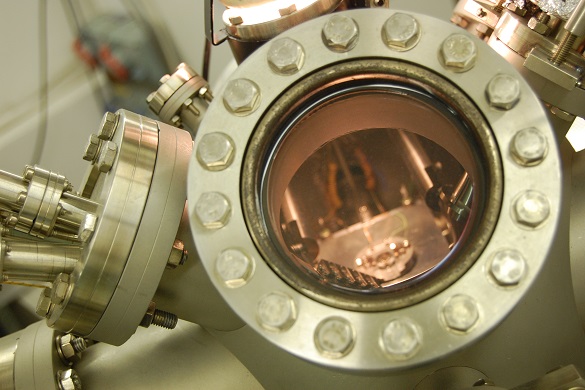
Advanced techniques at Liverpool are helping to tackle challenges in Biofilm research
The National Biofilms Innovation Centre, which the University of Liverpool co-directs, has announced a £7.5 million investment for its Phase 2 roll out.
Announced during Biofilm Week and World Antimicrobial Awareness Week, the £7.5 million award from the Biotechnology and Biological Sciences Research Council and Innovate UK will build upon NBIC’s collective strength as the UK’s national centre and support the continued expansion of world-class research and innovation.
In addition to the funding provided by BBSRC and Innovate UK, NBIC has also secured a further £9.5m from its four lead universities (Liverpool, Edinburgh, Nottingham and Southampton) as well as £6.4m industrial support, taking its Phase 2 funding to a total of £23.4m.
The NBIC is a UK Innovation and Knowledge Centre, which exists to create a fusion of world-class interdisciplinary research and industry partnerships to deliver breakthrough science and technologies to control and exploit biofilms.
The University of Liverpool is one of NBIC’s four lead research institutions and its involvement is through the Open Innovation Hub for Antimicrobial Surfaces, a multi-disciplinary initiative to develop new processes and technologies to tackle biofilm and antimicrobial resistance, which is led by Professor Rasmita Raval.

The NBIC was launched in 2017 and is led by four Co-Directors including Professor Raval alongside Professors Cait MacPhee, Miguel Cámara and Jeremy Webb respectively. Since its inception, the centre has expanded partnerships with 59 research institutions and more than 150 companies across the UK.
Biofilms are central to our most important global challenges, from antimicrobial resistance and food safety to water security. They also provide a significant contribution to both the UK and global economy. In May 2022, a study carried out by NBIC estimated that the value of the markets in which biofilms are involved is worth £45 billion in the UK and $4 trillion globally.
To date, NBIC has collaborated with over 150 industrial, research and public partners in the UK and overseas to develop joint-industry programmes that are tackling major economic and societal issues affecting the world today.
The latest funding from BBSRC and Innovate UK will support NBIC’s vision to deliver a global innovation hub by building on its collective strengths to prevent, detect, manage and engineer biofilms. It will enable NBIC to drive the adoption of innovative solutions across industry sectors to address major global challenges including climate change, water safety and improved healthcare. It will also drive step-changes in standards and regulation for novel biofilm solutions that support international trade.
Phase 2 will also see NBIC deliver a diverse training programme to equip the biofilm innovation ecosystem with the skills they need both now and, in the future, while also nurturing the talent of tomorrow.
This funding comes at the same time as NBIC announces its new CEO, Professor Jo Slater-Jefferies. Professor Slater-Jefferies joined NBIC in April 2018 and brings a wealth of experience and leadership in knowledge exchange, academic and industry collaboration and strategic research programmes to the role.
NBIC University of Liverpool Co-Director, Professor Rasmita Raval said: “Liverpool is proud to be a core partner of NBIC. The next phase of NBIC is critical for the UK to consolidate its global leadership in biofilms science, standards, innovation and skills training. NBIC also plays an important role in Liverpool’s growth agenda, as our city region sets its ambitious targets for the coming decade. I am strongly committed to our ethos of academia and industry collaborating together, bringing our collective knowledge, strengths and talents to address some of society’s most pressing problems.”
Steve Rotheram, the Liverpool City Region Mayor, said: “Our area is already home to some of the world’s leading clusters of innovation, with unparalleled strengths in AI, infection control and materials chemistry right on our doorstep. I want to harness these strengths – and potential – and turn them into profitable businesses, creating better, greener jobs and bringing greater prosperity to local people.
“Locally, we’re putting our money where our mouth is, with plans to invest 5% of GVA into R&D and plans that could create around 44,000 highly-skilled jobs for local people and add £42bn to the local economy.
“The University of Liverpool has a massive role to play in helping us to achieve that ambition – and this latest investment in the National Biofilm Innovation Centre is testament to the incredible impact it has made – and I cannot wait to see what opportunities arise on this next chapter in its journey.”
This funding comes at the same time as NBIC announces its new CEO, Professor Jo Slater-Jefferies. Professor Slater-Jefferies joined NBIC in April 2018 and brings a wealth of experience and leadership in knowledge exchange, academic and industry collaboration and strategic research programmes to the role.
Dr Lee Beniston FRSB, Associate Director for Industry Partnerships and Collaboration at BBSRC, said: “I am delighted to announce a further £7.5 million joint investment from BBSRC and Innovate UK in support of NBIC Phase 2, which builds upon our £12.5 million investment from Phase 1. On behalf of BBSRC, I congratulate Professor Slater-Jefferies on her appointment as the new CEO of NBIC. This is a vital strategic partnership investment for BBSRC and Innovate UK that has delivered outstanding impacts over the past five years. I am therefore pleased that BBSRC and Innovate UK will continue to take a joint approach to co-investing in, and providing strategic support for, NBIC over the next five years.”
Richard Hebdon, Director for Health and Life Sciences at Innovate UK, said: “NBIC has established itself as a key part of the UK’s life sciences ecosystem and supports innovation through to commercialisation. It enables businesses to access partners, facilities and funding while providing a single point of contact for advice and support. As well as making the UK more attractive to inward investment by driving the development and adoption of international standards, it also promotes UK research and innovation on the international stage. NBIC has demonstrated that it can effectively drive the translation of research into industry and create a pipeline of cross-disciplinary, industry-ready skills and talent. Innovate UK congratulates Professor Slater-Jefferies on her appointment to the role of CEO at this exciting time for NBIC, as Innovate UK and BBSRC commit to funding the national centre for the next five years.”
The University of Liverpool ’s Open Innovation Hub for Antimicrobial Surfaces combines interdisciplinary surface and materials science expertise with advanced imaging techniques across the physical and life sciences. The pivotal role of surfaces in biofilm formation is studied with precision – often at the nanoscale and single-cell level- enabling structure-property relationships that govern microbial adhesion, biofilm development and antimicrobial action to be established. The Hub creates seamless interactions between researchers, industry and clinicians, enabling science and innovation to progress together.
Find out more about NBIC’s achievements to date and future plans for the Phase 2 rollout in their annual report.